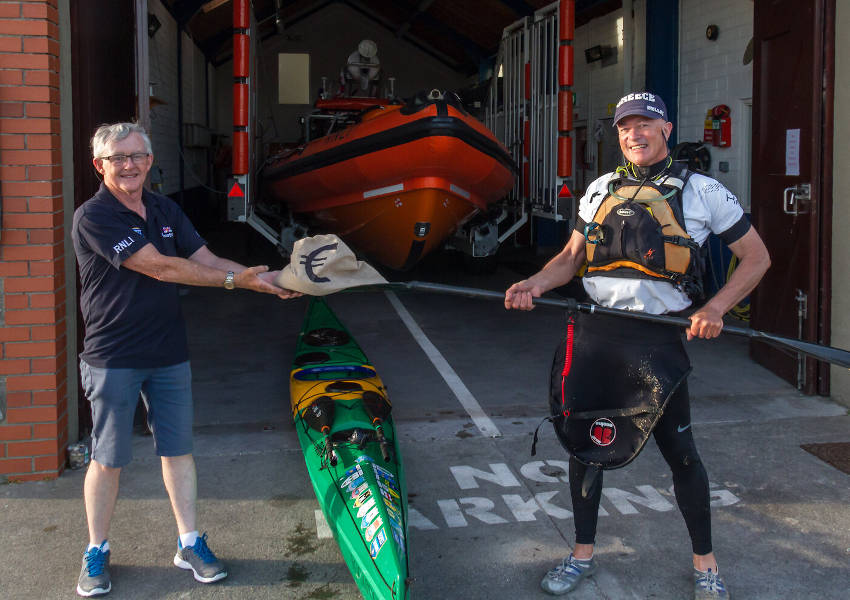Sea swimmer and experienced kayaker Kevin O’Sullivan has presented Skerries RNLI with a donation of €1,200 from monies raised while kayaking solo around the island of Ireland.
Kevin’s three-year venture started in 2016 and was spurred by his love of kayaking.
“After over 35 years of kayaking, looming large in front of me was my own personal edge,” he explains of his decision to embark on the solo circumnavigation.
“I had been operating as a volunteer kayak instructor with Skerries Sea Scouts for seven years. Being inspired by the courage of the many junior paddlers within their ranks, I decided it was high time I ventured outside my own comfort zone as this mission materialised out of the faintest whisper of a long-held dream I had thought about for years.”
During the planning of the trip, Kevin said he was aware of the work done by volunteers at his local RNLI station in Skerries, and Medicins Sans Frontiers in the Mediterranean.
“I decided to put a charity element to my venture. Monies raised were split down the middle and shared.
“My local involvement with The Frosties, a year-round sea swim group, gave me first-hand knowledge of the very critical service the RNLI offers to all water users. We have availed of their service on a few occasions.
“I am not alone in complimenting their non-judgemental approach to any rescue they carry out. It is wonderful to give something back to this great organisation.’
Kevin’s circumnavigation was all the more remarkable in that he achieved it in his spare time, committing to the adventure for almost three years.
“I would kayak a stretch over a few days, camping as I went, depositing my kayak with a helpful soul, whilst returning home to family and work for a period.

“When the next favourable weather window opened coincident with my time off work, I would return to my boat continuing along the coast, all the while eating away at the total distance of 1,750 km to put me back into Skerries where I started.”
First circumnavigated in 1978 by a three-man team, around 100 have now completed the trip, mostly in small groups.
“Only 25 of these have been solo. Mick O’Meara, from Waterford, holds the record at 23 days, and was my own personal inspiration for the trip.”
Kevin says he wasn’t sure he could “stomach” the challenge due to his propensity for sea sickness, but the story of Mick O’Meara kept his spirits up.
“Thankfully I was graced with good weather, great support and my body held out so that after three summers, my kayak found itself being slid back onto its rack after a 903-day absence.”
Kevin recalled of his achievement: “I camped, B&Bed, was put up by strangers, slept in adventure centres, friends’ houses and hostels. I used planes, trains and automobiles to get to and from the remotest corners of this island to complete my paddling project.
“Once, in fact, I walked two-and-a-half kilometres on the Hook Peninsula to get to my B&B from the beach I landed on, back in November 2017. The proprietor, who very kindly reopened his B&B for me, stood shocked when I rolled my 18ft long kayak up his driveway rather than atop my car.”
Gerry Canning, volunteer lifeboat press officer for Skerries RNLI, commended Kevin for his fundraising efforts on behalf of the station.
“This was a phenomenal effort with an amazing amount raised for Skerries RNLI and we want to say a huge thank you to Kevin. With so many fundraising events cancelled this year, donations like this are even more crucial.
“We can really feel Kevin’s pride for what he has achieved and his enthusiasm for helping the charities he donated to. These funds are very much appreciated by all here at Skerries and will help us to continue to save lives at sea.”
































































